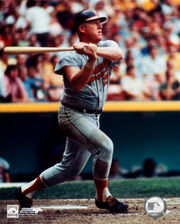
A photo of Boog Powell.
John Wesley Powell (born August 17, 1941, in Lakeland, Florida) is a former first baseman in Major League Baseball who played for the Baltimore Orioles (1961–74), Cleveland Indians (1975–76) and Los Angeles Dodgers (1977). He batted left-handed and threw right-handed.
Powell currently owns Boog's Barbecue, which sells barbecue sandwiches and ribs along Eutaw Street at Oriole Park at Camden Yards and along the Boardwalk in Ocean City, Maryland. Boog Powell is an avid angler, kicking off the Maryland Fishing season with the governor.
Biography[]
Powell joined the Orioles after leading the International League in home runs at Rochester in 1961, and spent his first three seasons as a slow-footed third baseman and left fielder before switching to first base in 1965. Offensively, he was an immediate success, hitting 25 home runs in 1963, then leading the American League in slugging percentage (.606) in 1964 while blasting a career-high 39 home runs despite missing several weeks because of a broken wrist. He slumped to .248 with 17 home runs in 1965, then won the American League Comeback player of the Year honors in 1966 (.287, 34 home runs, 109 runs batted in) while being hampered by a broken finger.
Baltimore's Glory Years[]
In 1966, Powell led the Orioles to the 1966 World Series, and there they surprised the baseball world by sweeping the mighty Los Angeles Dodgers in four games to become baseball's world champions.
Before the 1968 season, Powell lamented, "once, just once, I'd like to go through a whole season without an injury," and he did just that, playing over 150 games each of the next three seasons. In 1969 he hit a career-high .304 with 37 home runs and 121 runs batted in, and in 1970 he was the American League Most Valuable Player, narrowly missing a .300 average on the last day of the season and hitting 35 home runs with 114 runs batted in. In the 1970 World Series, Powell homered in the first two games as the Orioles defeated the Cincinnati Reds in 5 games. Prior to the 1971 season, Powell appeared on the cover of Sports Illustrated for the 1971 baseball preview issue. Powell helped Baltimore to a third straight World Series that year, blasting a pair of home runs in game two of the American League Championship Series against the up-and-coming Oakland Athletics, but he hit only .111 in the 1971 World Series as Baltimore lost to the Pittsburgh Pirates in seven games.
Calling It A Career[]
Powell had been an American League all-star for four straight years (1968-1971). However, Oriole manager Earl Weaver believed in making liberal use of the platoon system, and in 1973 and 1974, Powell fell victim to it, limiting his at-bats in both years. The aging slugger was traded to Cleveland with Don Hood for Dave Duncan and a minor leaguer before the 1975 season, affording Powell the chance once again to play every day. He responded well to the challenge, hitting .297 with 129 hits and 27 home runs for the Indians that year (his highest marks since 1970), plus fielding his position at a .997 clip. But he hit only nine home runs in 1976 and none as a pinch-hitter for the Dodgers in 1977 and was released August 31, 1977.
Career[]
In a 17-season career, Powell posted a .266 batting average with 339 home runs and 1187 RBI in 2042 games. Powell hit three home runs in a game three times, and was second only to Eddie Murray on the Orioles all-time home run list before Cal Ripken Jr. surpassed Powell in 1994.
See also[]
- Top 500 home run hitters of all time
- List of Major League Baseball players with 1000 RBI
- Major League Baseball hitters with three home runs in one game
External links[]
- Career statistics and player information from Baseball-Reference, or Fangraphs, or The Baseball Cube
- Baseball Library - profile
